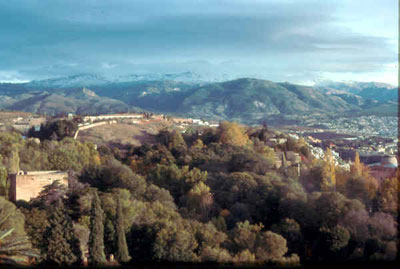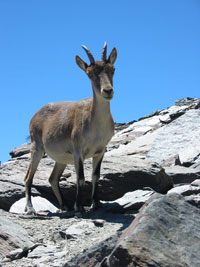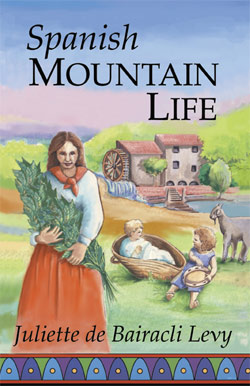 So
vast a mountain is the Sierra Nevada range that it is a country
in itself, with its towns and many villages, its rivers and
streams, and the strange ways of the people who farm or trade
or merely live there, and who preserve very truly much of
the ancient life of Spain.
So
vast a mountain is the Sierra Nevada range that it is a country
in itself, with its towns and many villages, its rivers and
streams, and the strange ways of the people who farm or trade
or merely live there, and who preserve very truly much of
the ancient life of Spain.
This book tells only about the mountain life in the area
of the water-mill where I lived from early spring to late
autumn, and where my second child was born and where I and
my first child nearly knew entombment in the cemetery of Lanjaron
as victims of the typhus fever which plagues that part of
the Sierra Nevada.
I arrived in the small sierra town of Lanjaron in March. The
town is a two-hours' bus ride from Granada; it has deserved
fame for its medicinal springs in the far part of the town
away from the Sierra Nevada towards the sierra of Montril.
It has fame also for its orchards, cheese and the basket-weaving
of the many gypsies who live in their own ancient quarters-barrios-of
Lanjaron.
I stayed at first in an inn in the town centre, overlooking
the part of the Nevada range where it meets that of Montril.
It was several weeks before I found my room and terrace garden
in the old water-mill of Gongoras at the foot of the Sierra
Nevada, some miles from the town.
That March the weather was bitter: the worst early spring
that had come to Andalusia in fifty years. Much snow had fallen
in Lanjaron, a rare thing in that town, the orange and lemon
crops were largely spoilt, and all the upper ranges of the
mountains wore cold white shrouds of deep frozen snow. Ravens
screamed in the blue-white air, hungry for the blood of the
newborn young of the sheep and goats which teemed on the mountain.
The men wore thick woollen cloaks and broad-brimmed felt hats
or tight berets, and the children's legs pricked uncomfortably
in the unaccustomed wear of coarse, woollen stockings. The
cold kept the people indoors, and over the entire town hung
a gauzy perfumed veil of rosemary smoke, that shrub being
the chief fuel of Lanjaron and the surrounding sierra farms.
Daily the men and boys- and sometimes the young women- collected
great bundles of rosemary from the mountain-sides, and brought
this fragrant fuel back to the town on their horses, mules
and donkeys, leaving a further scented trail as the rosemary
brushed against the walls of the houses in the narrow way
close by the water-mill.
 Nearly
every family in the town owned a transport animal, and many
owned also goats, chickens, pigeons and a pig or two. These
animals were stabled strangely in the ground-floor rooms or
basements of the houses. When I lived in the inn I was amused
by a herd of goats which was stabled in a house facing my
window. Every morning around seven o'clock the door was opened
wide, and out into the street hurried forth an immense family
of goats, fifty strong or more, of all sizes and colours,
including many of the lovely blue-grey shade of wild lavender,
a type of fine-horned goat much seen on the Sierra Nevada
where, also, many wild goats live. For a reason beyond explaining,
I was always reminded of the Pied Piper of Hamelin: and yet
this was a going forth into the light, not an entry into the
darkness of a mountain. Perhaps that thought came to me because
of the music of the goat bells, which altogether seemed to
produce a wild piping: and perhaps also I was influenced by
the tall hat and the cloak of the youth who shepherded the
flock.
Nearly
every family in the town owned a transport animal, and many
owned also goats, chickens, pigeons and a pig or two. These
animals were stabled strangely in the ground-floor rooms or
basements of the houses. When I lived in the inn I was amused
by a herd of goats which was stabled in a house facing my
window. Every morning around seven o'clock the door was opened
wide, and out into the street hurried forth an immense family
of goats, fifty strong or more, of all sizes and colours,
including many of the lovely blue-grey shade of wild lavender,
a type of fine-horned goat much seen on the Sierra Nevada
where, also, many wild goats live. For a reason beyond explaining,
I was always reminded of the Pied Piper of Hamelin: and yet
this was a going forth into the light, not an entry into the
darkness of a mountain. Perhaps that thought came to me because
of the music of the goat bells, which altogether seemed to
produce a wild piping: and perhaps also I was influenced by
the tall hat and the cloak of the youth who shepherded the
flock.
The goats! The goats!' always shouted my two-year-old son
Rafik, in his shrill Spanish. He was daily at the window to
watch them and the many other animals which made up the long
morning procession to the mountain, where the snows melting
beneath a cold wintry sun had given place in many parts to
stretches of sweet new grass, and there was leafage again
on the bushes and wild flowers amongst the rocks, hyacinths
and cyclamens.
to
be continued...
this is a pre-publication preview compliments of Ash
Tree Publishing...
Read
Juliette's bio, click here for her personal page
“In Memory of Juliette the Grandmother of Herbal medicine”


Spanish Mountain Life
Author: Juliette de Bairacli Levy.
This jewel-like memoir by noted herbalist and traveler Juliette de Bairacli Levy details her personal struggle against typhus fever, during which she gave birth to her second child, Luz, who had to be suckled by a nanny goat. As ever we are embraced by Juliette's love of nature and animals, and welcomed onlookers as she relates with people whose lives are far different from ours. 114 pages,
index, illustrations.
Retails
for $16.95
buy
Spanish Mountain Life in our Bookshop

 So
vast a mountain is the Sierra Nevada range that it is a country
in itself, with its towns and many villages, its rivers and
streams, and the strange ways of the people who farm or trade
or merely live there, and who preserve very truly much of
the ancient life of Spain.
So
vast a mountain is the Sierra Nevada range that it is a country
in itself, with its towns and many villages, its rivers and
streams, and the strange ways of the people who farm or trade
or merely live there, and who preserve very truly much of
the ancient life of Spain. Nearly
every family in the town owned a transport animal, and many
owned also goats, chickens, pigeons and a pig or two. These
animals were stabled strangely in the ground-floor rooms or
basements of the houses. When I lived in the inn I was amused
by a herd of goats which was stabled in a house facing my
window. Every morning around seven o'clock the door was opened
wide, and out into the street hurried forth an immense family
of goats, fifty strong or more, of all sizes and colours,
including many of the lovely blue-grey shade of wild lavender,
a type of fine-horned goat much seen on the Sierra Nevada
where, also, many wild goats live. For a reason beyond explaining,
I was always reminded of the Pied Piper of Hamelin: and yet
this was a going forth into the light, not an entry into the
darkness of a mountain. Perhaps that thought came to me because
of the music of the goat bells, which altogether seemed to
produce a wild piping: and perhaps also I was influenced by
the tall hat and the cloak of the youth who shepherded the
flock.
Nearly
every family in the town owned a transport animal, and many
owned also goats, chickens, pigeons and a pig or two. These
animals were stabled strangely in the ground-floor rooms or
basements of the houses. When I lived in the inn I was amused
by a herd of goats which was stabled in a house facing my
window. Every morning around seven o'clock the door was opened
wide, and out into the street hurried forth an immense family
of goats, fifty strong or more, of all sizes and colours,
including many of the lovely blue-grey shade of wild lavender,
a type of fine-horned goat much seen on the Sierra Nevada
where, also, many wild goats live. For a reason beyond explaining,
I was always reminded of the Pied Piper of Hamelin: and yet
this was a going forth into the light, not an entry into the
darkness of a mountain. Perhaps that thought came to me because
of the music of the goat bells, which altogether seemed to
produce a wild piping: and perhaps also I was influenced by
the tall hat and the cloak of the youth who shepherded the
flock.

